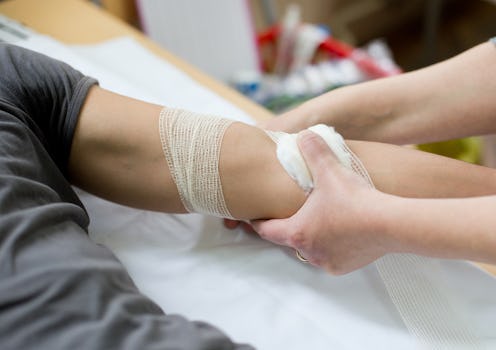News
FDA Lifts Ban On Blood Donations By Gay Men

The Food and Drug Administration has just announced that it's finally lifting its ban on blood donations by men who have had sex with men since 1977... kind of. Gay men who wish to donate blood are required to take a one year deferral — meaning, one year must have passed since they last had sexual contact with another man before they can donate. This is similar to the deferral that the FDA imposes on other people it considers to be at increased risk of carrying blood-borne pathogens, like those who have received a blood transfusion. On the one hand, the new recommendations represent a positive sea change in policy, backed by substantial scientific evidence; but on the other, they still serve as a highly stigmatizing factor for men who have sex with men (MSM) in America, by automatically classifying gay sex as a risk factor for HIV.
In the 1980s, during the midst of the HIV/AIDS crisis, when no one understood what was causing the epidemic and how to stop it, a hasty ban on blood donation from gay men was put in place as clinicians started to link the catastrophic illness with the gay community, particularly in regions like San Francisco. Complicated social and cultural factors increased the incidence of high-risk sexual activity among gay men at the time — but those factors have changed, with many gay men today living under the shadow of AIDS and taking rigorous precautions to protect themselves and their partners. The ban, however, remained unchanged for 30 years, defying major scientific evidence and social progress that suggested that it is no longer relevant, and excluding the donation of untold units of blood by willing donors, including those with rare blood types who are desperately in demand.
At the height of contamination in the blood supply, those receiving transfusions ran a one in 2,500 risk of contracting HIV from blood — a risk that increased significantly for those receiving factor IV and clotting agents to treat conditions like hemophilia (Ryan White became a poster child for those infected this way). Today, that risk is one in 1.47 million, reflecting progress that includes better screening of donated units of blood, as well as donors themselves. The American Medical Association, multiple blood banks, and regional governments have issued statements and resolutions demanding an end to the ban — which the AMA called "discriminatory."
Requirements for prospective blood donors are, understandably, quite stringent, as the medical community and donors alike do not want to introduce hazards into the blood supply. Donors must be at least 17 (16 with parental permission), and they're subject to travel restrictions related to the transmission of diseases like Creutzfeldt-Jakob disease, malaria, and now Ebola. Donors also need to be feeling well on the day of donation, another reasonable request — people who've recently had coughs or colds, or who are running a fever, are asked to return at a future date. Certain medications also render people ineligible for donations.
Then, the FDA gets into "lifestyle" and "high-risk" activities, which include piercings and tattoos, regardless of sanitation practices. Blood banks also classify sex work (sorry, "prostitution") as an exclusion, rendering potential donors ineligible to give blood if they have been involved in the industry after 1977 — another rule that claims that an activity is a high risk behavior based on preconceived notions, rather than what people are actually doing. Some sex workers use stringent precautions when working with clients, having safer sex than many people not in the industry. Others, due to circumstances or other issues — like, for example, being raped by clients — may not, and asking detailed questions about these kinds of factors would be more productive than telling sex workers they can't donate. Similar issues surround the stigma that haunts MSM.
Today's announcement might sound like a victory for MSM, finally striking down a discriminatory rule. But in truth, it really just serves to underscore discrimination against gay men and queer people in general, by signaling a claim that gay sex is inherently risky. Plenty of straight sex is risky, including unprotected sex — but that's not listed as an automatic no-no, because to exclude all people who've had sex since 1977 (or even all people who have had sex within the last year) would be a move that would radically narrow the donor field.
I believe it's insulting and deeply offensive to suggest that gay men need to take a one year deferral in order for their blood to be considered good enough for the U.S. blood supply — and the FDA can't even adjust the deferral downwards because it doesn't have enough data on what happens when the deferral is lifted or shortened. We need that data ASAP — so that we can move to a new phase of blood donation protocol that focuses on individual donor screenings, which provide a more accurate snapshot of whether someone's donation could be a risk. Better to ask, "Have you had unprotected sex?" than "Are you gay and sexually active?" — because one of those things carries a deep note of homophobia, while the other is an entirely reasonable and practical question.
Images: Getty Images; Fotolia